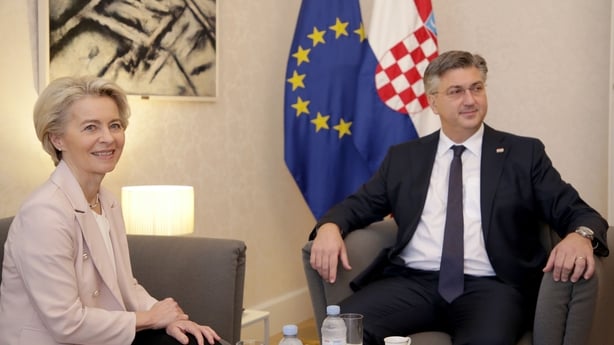Croatia has become the 20th member of the Eurozone after discontinuing use of its kuna currency.
As per RTE News Report:
After joining the European Union about ten years ago, Croatia has reached two significant milestones: the adoption of the Euro and entry into the passport-free zone of Europe.
The Balkan country said goodbye to its kuna currency at midnight (23:00 on Saturday, Irish time), becoming the 20th member of the Eurozone.
It is the 27th country in the largest passport-free region in the world, known as Schengen, which allows more than 400 million people to travel freely inside its borders.
According to experts, the adoption of the Euro will protect Croatia’s economy at a time when global inflation is on the rise as a result of Russia’s invasion of Ukraine, which drove up the cost of food and fuel.
However, opinions vary among Croatians.
While many people are happy that border checks are no longer necessary, some are concerned about the Euro transition because right-wing opposition parties claim it mainly benefits powerful nations like Germany and France.
Drazen Golemac, a 63-year-old pensioner from Zagreb, predicted that “we will scream for our kuna” and that “prices would soar.”
Many Croats worry that the adoption of the Euro would result in price increases, especially because they think that firms will round up price points when they convert.
Elite club
For tourist agency employee Marko Pavic, “Croatia joins an elite club”.
“The Euro was already a value measure – psychologically it’s nothing new – while entry into Schengen is fantastic news for tourism,” he told AFP.
Use of the Euro is already widespread in Croatia.
Croatians have long valued their most precious assets such as cars and apartments in Euros, displaying a lack of confidence in the local currency.
About 80% of bank deposits are denominated in Euros and Zagreb’s main trading partners are in the Eurozone.

Prime Minister Andrej Plenkovic stated that the decision to join the eurozone and Schengen was made in order to achieve “two strategic goals of a greater EU integration.”
Croatia, a 3.9 million-person former Yugoslav country that waged an independence war in the 1990s, ascended to membership in the European Union in 2013.
“The Euro undoubtedly gives (economic) stability and safety,” Croatian National Bank (HNB) Ana Sabic said to AFP.
According to experts, the introduction of the Euro will make borrowing more affordable during hard times.
In November, the inflation rate in Croatia was 13.5% compared to 10% in the eurozone.
Analysts emphasise that countries in the east of the EU, like Poland or Hungary, that use currencies that are not part of the eurozone have been considerably more sensitive to rising inflation.
Bye-Bye Borders
HNB governor Boris Vujcic said while it was a nostalgic moment for him, it was the “only reasonable politics” as some Croatians regretted the passing of the national currency.
During the independence fight in 1994, the kuna was introduced.
Kuna is the name for the marten, a carnivore resembling a weasel whose fur used as money throughout the Middle Ages.
Today in the heart of Zagreb, Mr. Vujcic will symbolically withdraw euros from a cash machine.
During Ursula von der Leyen’s visit, the interior and foreign ministers will take part in brief ceremonies at border crossings with Slovenia and Hungary, two of Croatia’s EU neighbours.
The two occasions were praised by local media, which dubbed them the “crown of (Zagreb’s) EU membership” in its best-selling Vecernji List daily.
Customers lined up in recent days at banks and ATMs to withdraw cash out of concern about payment issues during the transition period’s immediate aftermath.
The vital tourism sector, which generates 20% of Croatia’s GDP, will benefit from the country’s admission into the Schengen borderless area.
The 73 land border crossings with Slovenia and Hungary will no longer have the lengthy lines they once did.
Due to technical difficulties, border checks at airports won’t stop until March 26.
On its eastern border with its non-EU neighbours Bosnia, Montenegro, and Serbia, Croatia will continue to conduct rigorous border checks.
The biggest obstacle in protecting the 1,350 km long external land border of the EU continues to be the fight against illegal immigration.
Featured Image: iShutterstock
💫FOLLOW US FOR MORE UPDATES. ❌WE DO NOT HAVE IRRITATING AND SPAMMY NEWSLETTERS. ✅EVERYTHING IS AND WILL BE FREE FOREVER. SEE YOU AGAIN IN YOUR STORIES AND FEED 🙂